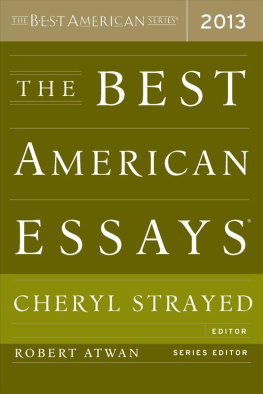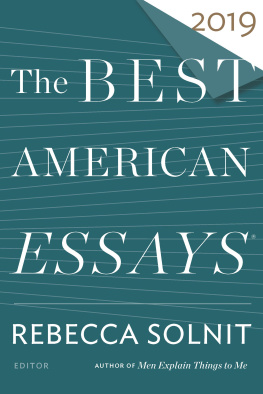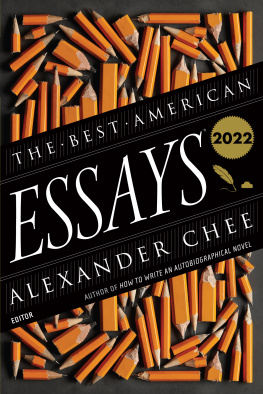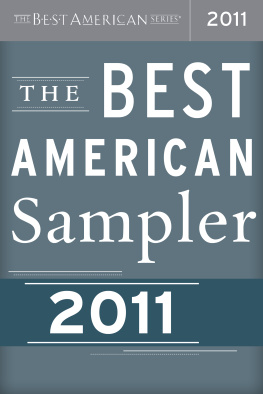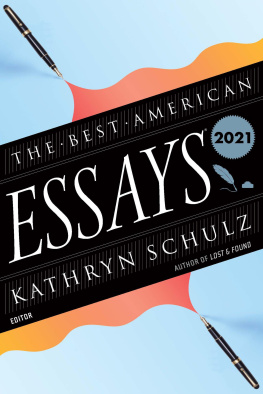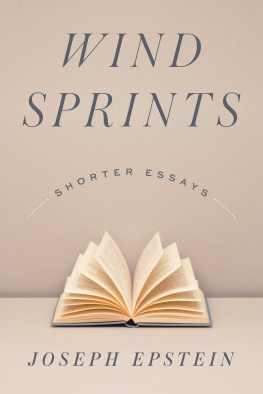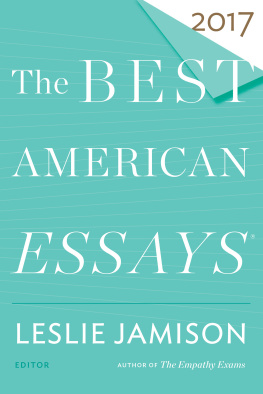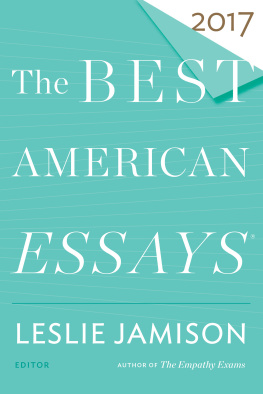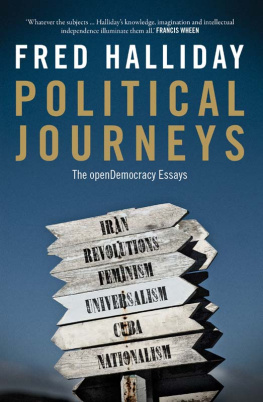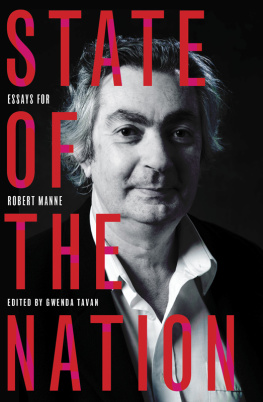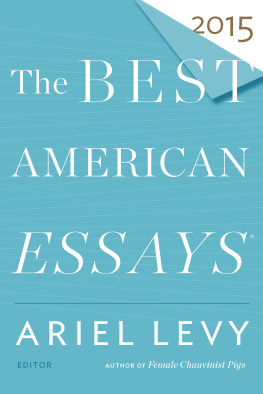Atwan Robert - The Best American Essays 2013
Here you can read online Atwan Robert - The Best American Essays 2013 full text of the book (entire story) in english for free. Download pdf and epub, get meaning, cover and reviews about this ebook. City: Boston, year: 2013, publisher: Houghton Mifflin Harcourt, genre: Detective and thriller. Description of the work, (preface) as well as reviews are available. Best literature library LitArk.com created for fans of good reading and offers a wide selection of genres:
Romance novel
Science fiction
Adventure
Detective
Science
History
Home and family
Prose
Art
Politics
Computer
Non-fiction
Religion
Business
Children
Humor
Choose a favorite category and find really read worthwhile books. Enjoy immersion in the world of imagination, feel the emotions of the characters or learn something new for yourself, make an fascinating discovery.
- Book:The Best American Essays 2013
- Author:
- Publisher:Houghton Mifflin Harcourt
- Genre:
- Year:2013
- City:Boston
- Rating:3 / 5
- Favourites:Add to favourites
- Your mark:
- 60
- 1
- 2
- 3
- 4
- 5
The Best American Essays 2013: summary, description and annotation
We offer to read an annotation, description, summary or preface (depends on what the author of the book "The Best American Essays 2013" wrote himself). If you haven't found the necessary information about the book — write in the comments, we will try to find it.
The Best American Essays 2013 — read online for free the complete book (whole text) full work
Below is the text of the book, divided by pages. System saving the place of the last page read, allows you to conveniently read the book "The Best American Essays 2013" online for free, without having to search again every time where you left off. Put a bookmark, and you can go to the page where you finished reading at any time.
Font size:
Interval:
Bookmark:
Copyright 2013 Houghton Mifflin Harcourt Publishing Company
Introduction copyright 2013 by Cheryl Strayed
ALL RIGHTS RESERVED
The Best American Series and The Best American Essays are registered trademarks of Houghton Mifflin Harcourt Publishing Company.
No part of this work may be reproduced or transmitted in any form or by any means, electronic or mechanical, including photocopying and recording, or by any information storage or retrieval system without the proper written permission of the copyright owner unless such copying is expressly permitted by federal copyright law. With the exception of nonprofit transcription in Braille, Houghton Mifflin Harcourt is not authorized to grant permission for further uses of copyrighted selections reprinted in this book without the permission of their owners. Permission must be obtained from the individual copyright owners as identified herein. Address requests for permission to make copies of Houghton Mifflin Harcourt material to Permissions, Houghton Mifflin Harcourt Publishing Company, 215 Park Avenue South, New York 10003.
www.hmhbooks.com
Library of Congress Cataloging-in-Publication data is available.
ISSN 0888-3742
ISBN 978-0-544-10388-7
e ISBN 978-0-544-10574-4
v1.1013
The Art of Being Born by Marcia Aldrich. First published in Hotel Amerika, Spring 2012. Copyright 2013 by Marcia Aldrich. Reprinted by permission of Marcia Aldrich.
Free Rent at the Totalitarian Hotel by Poe Ballantine. First published in The Sun, June 2012. Copyright 2012 by Poe Ballantine. Reprinted by permission of Poe Ballantine.
What Happens in Hell by Charles Baxter. First published in Ploughshares, Fall 2012. Copyright 2012 by Charles Baxter. Reprinted by permission of Darhansoff & Verrill Literary Agents.
Letter from Majorca by J. D. Daniels. First published in The Paris Review, Summer 2012. Copyright 2012 by J. D. Daniels. Reprinted by permission of J. D. Daniels.
His Last Game by Brian Doyle. First published in Notre Dame Magazine, Autumn 2012. Copyright 2012 by Brian Doyle. Reprinted by permission of Brian Doyle.
A Little Bit of Fun Before He Died by Dagoberto Gilb. First published in ZYZZYVA, Fall 2012. Copyright 2012 by Dagoberto Gilb. Reprinted by permission of Dagoberto Gilb. Fun by Wyn Cooper originally appeared in The Country of Here Below, Ahsahta Press, 1987. Reprinted by permission of the author.
When They Let Them Bleed by Tod Goldberg. First published in Hobart, Winter/Spring 2012. Copyright 2012 by Tod Goldberg. Reprinted by permission of Tod Goldberg.
The Book of Knowledge by Steven Harvey. First published in River Teeth, Spring 2012. Copyright 2012 by Steven Harvey. Reprinted by permission of Steven Harvey.
Breeds of America by William Melvin Kelley. First published in Harpers Magazine, August 2012. Copyright 2012 by William Melvin Kelley. Reprinted by permission of the author.
Triage by Jon Kerstetter. First published in River Teeth, Spring 2012. Copyright 2011 by Jon R. Kerstetter. Reprinted by permission of the author.
Confessions of an Ex-Mormon by Walter Kirn. First published in The New Republic, August 2, 2012. Copyright 2012 by Walter Kirn. Reprinted by permission of Walter Kirn.
Epilogue: Deadkidistan by Michelle Mirsky. First published in McSweeneys, November 8, 2012. Copyright 2012 by Michelle Mirsky. Reprinted by permission of Michelle Mirsky.
The Exhibit Will Be So Marked by Ander Monson. First published in Normal School, Spring 2012. Copyright 2013 by Ander Monson. Reprinted by permission of Ander Monson.
The Girls in My Town by Angela Morales. First published in Southwest Review, 97/2. Copyright 2012 by Angela Morales. Reprinted by permission of Southwest Review and Angela Morales.
Night, from Dear Life by Alice Munro, copyright 2013 by Alice Munro. Used by permission of Random House, Inc. Any third party use of this material, outside of this publication, is prohibited. Interested parties must apply directly to Random House, Inc. for permission. First published in Granta, Summer 2012.
Pigeons by Eileen Pollack. First published in Prairie Schooner, Spring 2012. Copyright 2012 by The University of Nebraska Press. Reprinted by permission of The University of Nebraska Press.
Im Jumping Off the Bridge by Kevin Sampsell. First published on Salon.com, August 3, 2012. Copyright 2012 by Kevin Sampsell. Reprinted by permission of Salon.com.
Sometimes a Romantic Notion by Richard Schmitt. First published in The Gettysburg Review, Autumn 2012. Copyright 2012 by Richard Schmitt. Reprinted by permission of Richard Schmitt.
El Camino Doloroso by David Searcy. First published in The Paris Review, Spring 2012. Copyright 2012 by David Searcy. Reprinted by permission of Aragi, Inc.
Some Notes on Attunement by Zadie Smith. First published in The New Yorker, December 17, 2012. Copyright 2012 by Zadie Smith. Reprinted by permission of the author.
Channel B by Megan Stielstra. First published in The Rumpus, November 9, 2012. Copyright 2012 by Megan Stielstra. Reprinted by permission of the author.
Ghost Estates by John Jeremiah Sullivan. First published as Where Hope and Human History Dont Rhyme The New York Times Magazine, February 12, 2012. Copyright 2012 by John Jeremiah Sullivan. Reprinted by permission of The Wylie Agency, LLC.
Highway of Lost Girls by Vanessa Veselka. First published as The Truck Stop Killer in GQ, November 2012. Copyright 2012 by Vanessa Veselka. Reprinted by permission of the author.
Keeper of the Flame by Matthew Vollmer. First published in New England Review, 33/1. Copyright 2013 by Matthew Vollmer. Reprinted by permission of the author.
Field Notes on Hair by Vicki Weiqi Yang. First published in South Loop Review, 14. Copyright 2013 by Vicki Weiqi Yang. Reprinted by permission of Vicki Weiqi Yang.
My Fathers Women by Mako Yoshikawa. First published in The Missouri Review, Spring 2012. Copyright 2012 by Mako Yoshikawa. Reprinted by permission of Mako Yoshikawa.
W HEN I BEGAN STUDYING literature as a graduate student in the early 1960s, I approached the subject in ways so many of my generation did, as the study of poetry, fiction, and drama. My bible at the time was a critical volume published in the late 1940s by Ren Wellek and Austin Warren called Theory of Literature, which clearly privileged fictive works over nonfiction, though literary works then were so exclusively identified with poems, novels, and plays that the privileging barely went noticed. When in the mid-sixties I took a seminar on Ralph Waldo Emerson with the brilliant critic and quintessential Emersonian Richard Poirier, we concentrated on Emerson as a thinker and prose stylist, as the central figure of American literature, but I dont recall a single bit of discussion that regarded Emerson as an essayist, as a writer wholly engaged with a particular literary genre.
Essays were a minor genre, at best, and at worst one of the many forms of subliterature. They didnt reward critical study except in the growing discipline of freshman composition, where students were exposed to the work of George Orwell, Virginia Woolf, James Baldwin, E. B. White, Loren Eiseley, Joan Didion, and many other essayists past and present, though in an academic setting that generally prioritized rhetoric over literature. As someone serving in the trenches of freshman composition, I also grew familiar with these writers, often through college essay anthologies designed to assist young instructors in teaching first-year students how to write effectively. My reading was thus divided between two opposing curriculathe main graduate school curriculum, which favored fiction, poetry, and drama, and the freshman writing curriculum, which permitted essays and literary nonfiction, such as that of Gay Talese, Gloria Steinem, Terry Southern, George Plimpton, Nora Ephron, and Norman Mailer, all of whose work I eagerly read and taught. It wasnt exactly schizoid, but it was always clear which works fell into the realm of serious literature and which didnt.
Next pageFont size:
Interval:
Bookmark:
Similar books «The Best American Essays 2013»
Look at similar books to The Best American Essays 2013. We have selected literature similar in name and meaning in the hope of providing readers with more options to find new, interesting, not yet read works.
Discussion, reviews of the book The Best American Essays 2013 and just readers' own opinions. Leave your comments, write what you think about the work, its meaning or the main characters. Specify what exactly you liked and what you didn't like, and why you think so.

